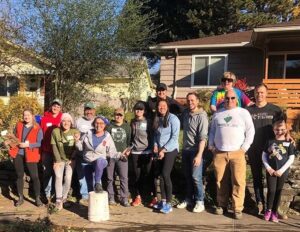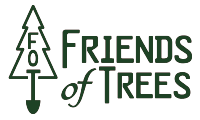Tag: PSU
An update on our Robert Wood Johnson Foundation partnership

Engaging Community to Take Climate Action
We know that trees fight climate change. And here at Friends of Trees our experience partnering with thousands of community members tells us that the volunteer experience also helps fight climate change – because folks who volunteer to plant and care for trees often go on to become involved with other environmental issues, including taking climate action.
We’re excited to share that through our partnership with the Robert Wood Johnson Foundation, APANO (Asian Pacific American Network of Oregon), Portland State University’s Toulan School of Urban Studies and Planning, OHSU-PSU Joint School of Public Health, and Willamette Partnership, we should soon have quantitative and additional qualitative data to support this. This project recognizes that “where one lives or works, one’s age, if one has pre-existing health conditions or chronic illnesses, and race or income all impacts how and how much climate change harms health.” Friends of Trees’ efforts over the past 20+ years of planting in east Portland and other low-canopy, underserved neighborhoods also recognizes this, and this partnership takes these efforts to the next level, especially around community involvement.
“Engaging with historically marginalized communities about where neighborhood change needs to happen and how it might happen are the first steps to ensuring an equitable urban forestry program.”
– Dr. Vivek Shandas, PSU, School of Urban Studies
A major project milestone is the formation of a community advisory board, facilitated by APANO, and comprised of people who live in, work in, or regularly engage with east Portland’s Jade District. Participants include a Friends of Trees tree recipient, a PSU student, a middle school student, a Rosemary Anderson High School/POIC graduate, a biology educator, and Multnomah County representation. Upcoming CAB activities include a live tree walk in the Jade District, exploring topics such as infrastructure challenges to adding trees (e.g., with so many parking lots, where and how do we plant trees?) and how to address these challenges.
“What’s really exciting about this project is the community advisory board, which isn’t something we usually have the resources to develop.” Michelle Yasutake, Friends of Trees Green Space Program Manager
Michelle’s project role involves a major project milestone, the formation of a community advisory board, facilitated by APANO, and comprised of people who live in, work in, or regularly engage with east Portland’s Jade District. Dr. Shandas is also a strong supporter of direct community involvement, “By integrating community voices with our technical know-how, this project is identifying ‘nature-based solutions’ in areas that have been neglected and disinvested by regional decision makers.”
Friends of Trees wants to do even more to engage people in the community in project planning and prioritizing, and we know that the best way to achieve diverse and authentic representation is to be able to provide stipends in consideration of the time it takes people to participate. The Robert Wood Johnson Foundation recognizes the value of this and its grant includes funding for these stipends. Michelle further emphasizes the importance of community involvement,
“This project, and the community advisory board, are so important to Friends of Trees’ goals around equity, diversity and inclusion and our efforts to genuinely work with the people who actually live and work in the community, and to do so in a way that ensures community members feel like they are truly a part of the process.”
Next steps in the project include data collection through surveying the community; we’re asking questions about neighborhood involvement, civic engagement such as voting, the impact of COVID on household income, and more. We’ll also take on a tangible project such as adding green infrastructure (trees, bioswales, shrubs) to a site identified as a priority by the community; and we’ll be using a research tool called Photovoice.
Photovoice is a hands-on, photography-based research method designed to help community members identify and discuss important community issues and take social action. Photovoice involves using cameras/smartphones to visually document, describe, and discuss important community concerns.
For this Photovoice project, adult and youth community residents will use photography and digital mapping to collaboratively identify and map out important climate, greenspace, and community health concerns—centering the perspectives of residents of East Portland and the Jade District. This will include identifying specific places and spaces that represent important locations of daily climate and greenspace experiences. The goal is to create new local climate and community health data that prioritizes community lived experience and knowledge, such that the data can be used to respond to specific community concerns.
The purpose of this partnership is to “Examine the physical and social dimensions of a tree planting program as a strategy to improve public health and mitigate climate change.” East Portland is one of seven communities across the country where RWJF is studying health, health equity and climate change solutions through its Culture of Health Action Framework, marking RWJF’s first foray into climate health solutions. As this project progresses we’ll share more milestones and updates, so stay tuned!
Photo at top: Friends of Trees East Portland tree planting event, November 2019.
A quintessential Portland tree course

By Joe Poracsky
During the Spring 2010 term (March 29 to June 11) the Portland State University Geography Department will offer “The Urban Forest,” GEOG 448/548.
This 4-credit, partially-on-line course, will meet once or twice a week, Monday and Wednesday 3:15 – 5:05. There will also be two Saturday class meetings for field trips to local sites of urban forest interest.
The class will examine a spectrum of issues relating to people and trees, including fundamentals of tree growth and health, the role of trees in the ecological, economic and social systems of the city, efforts to protect urban trees, local regulations regarding urban trees, issues in species and site selection for planting, and techniques for inventorying and evaluating the health of the urban forest.
For further information, contact the instructor, Joe Poracsky: 503-725-3158, [email protected].
Poracsky is a PSU professor and Portland Urban Forest Commission Member.
